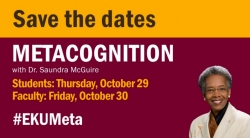Why Metacognition?
On October 29th and 30th, EKU will host Dr. Saundra McGuire, an internationally known scholar of student learning and metacognition. In fact, much of her research focuses on teaching students metacognitive learning strategies.
While visiting EKU, Dr. McGuire will lead three workshops, one for students:
Dr. Saundra McGuire
METACOGNITION: THE KEY TO ACING COURSES!
Thursday, October 29, 2015
6-8pm
Brock Auditorium
And two workshops for faculty and academic staff on Friday, October 30, both in O’Donnell Auditorium in the Whitlock Building:
8:30-11:30am Getting Students to Focus on Learning Instead of Grades: Metacognition is Key!
12:30-2:30pm Approaches for Teaching Metacognitive Strategies to Individuals and Groups
Members of the EKU community can still register for these workshops online.
At a basic level, metacognition is thinking about one’s own thinking. A more complex understanding, however, involves controlling one’s cognitive process and evaluating one’s learning. Dr. McGuire will help us think about ways we can build these strategies into our classes to enhance student learning here at EKU. That is, Dr. McGuire will provide strategies that faculty can use to teach students to increase metacognitive learning along with strategies for reflecting on improving our teaching and student learning.
Why should we focus on metacognition in teaching and learning? A few framing thoughts to consider this week:
“Teaching practices congruent with a metacognitive approach to learning include those that focus on sense-making, self-assessment, and reflection on what worked and what needs improving” (National Research Council 12).
“When students employ metacognition, they become consciously aware of themselves as problem solvers, which enables them to actively seek solutions to any problems they may encounter, rather than relying on others to tell them what to do or to answer their questions” (McGuire 16).
“One way to engage students is to help them become involved in and responsible for their own learning, making decisions about how they go about learning in addition to deciding what they want to learn and how they want to use that learning. Metacognition allows students to make decisions about how they learn best by helping them become aware of what they are doing when they are learning” (Silver, “Reflective Pedagogies,” Using Reflection and Metacognition 3).
As we consider the role of metacognition in student learning, you can follow along on the Noel Studio’s social media: @noelstudio and #EKUMeta. We encourage you to tweet questions, ideas, and strategies throughout the week and during the workshops.
The Noel Studio will host a session on Thursday, November 12, 11:30am-12:30pm, to gather and discuss additional ideas about ways to incorporate metacognition strategies from these workshops into our teaching and learning efforts at EKU. We encourage you to register online.
Resources:
Kaplan, Matthew, Naomi Silver, Danielle Lavaque-Manty, and Deborah Meizlish, eds. Using Reflection and Metacognition to Improve Student Learning. Sterling: Stylus, 2013. Print.
McGuire, Saundra Yancy, and Stephanie McGuire. Teach Students How to Learn: Strategies You Can Incorporate Into Any Course to Improve Student Metacognition, Study Skills, and Motivation. Sterling: Stylus, 2015. Print.
National Research Council. How People Learn: Brain, Mind, Experience, and School. Washington, D.C.: National Academy Press, 2000. Print.
Published on October 26, 2015
